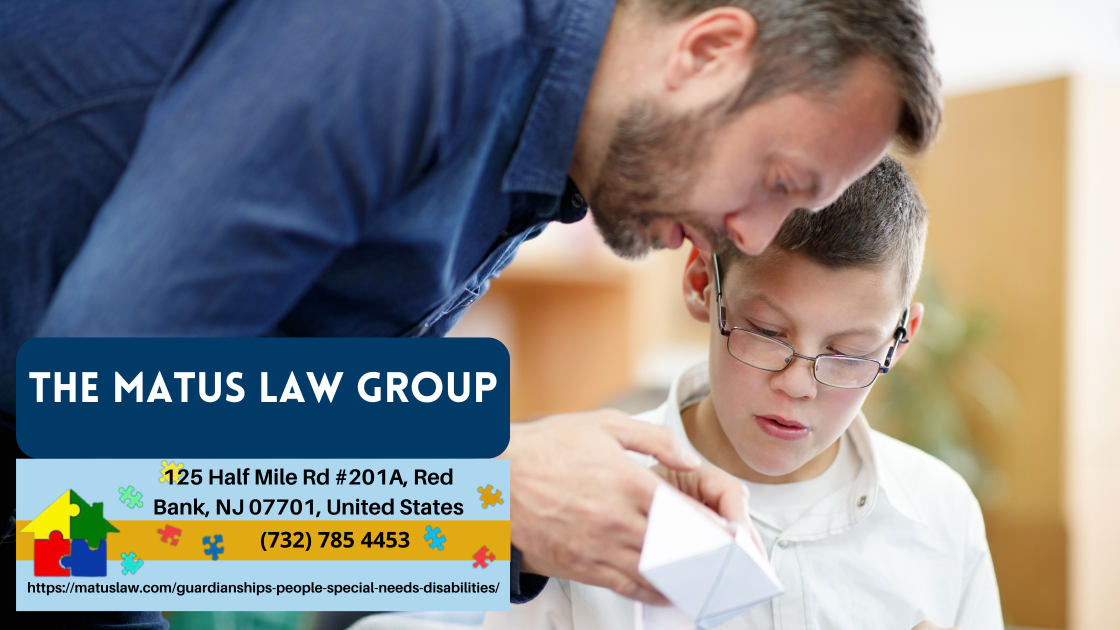New Jersey guardianship attorney Christine Matus (https://matuslaw.com/guardianships-people-special-needs-disabilities/) of The Matus Law Group has released an enlightening article titled “Guardianship for People with Disabilities.” This comprehensive piece addresses the critical issues surrounding guardianship arrangements for individuals with disabilities, providing essential information for parents and guardians navigating this complex legal landscape.
Christine Matus, a distinguished New Jersey guardianship attorney, explores the implications of reaching the legal age of majority at 18 in New Jersey. At this age, individuals are legally empowered to make their own decisions, a situation that can present significant challenges for parents of children with disabilities. “In New Jersey, everyone who reaches the age of 18 will be able to legally make their own decisions,” Matus states. “This is true even when the child has disabilities that may make them unable to make sound decisions regarding their care or other important aspects of their life.”
The article emphasizes the importance of guardianship arrangements in ensuring the well-being of individuals who cannot make decisions for themselves. New Jersey guardianship attorney Christine Matus explains that a guardian acts on behalf of an incapacitated person or minor, ensuring their health, welfare, and safety needs are met while protecting their rights. “A guardian is someone who can act on behalf of either a minor or an incapacitated person, ensuring that their health, welfare, and safety needs are met,” Matus elaborates.
The article by New Jersey guardianship attorney Christine Matus also delineates the circumstances under which guardianship might be necessary. Matus clarifies that guardianship is appropriate when someone is incapable of managing their own affairs, such as finances or healthcare. She distinguishes between guardianship and conservatorship, noting that while guardians make decisions for their ward, conservators manage the ward’s estate. “Even though they can seem similar, guardianship is different from conservatorship,” Matus points out. “In a guardianship, the guardian will have to make decisions on behalf of their ward. In a conservatorship, the conservator will make decisions about the ward’s estate.”
Furthermore, the article explores the types of guardianship available, including general and limited guardianships. General guardianship, also known as plenary guardianship, is necessary when the ward cannot make any decisions for themselves. Limited guardianship, on the other hand, is tailored to specific categories such as legal, healthcare, financial, or residential decisions. “Your child may be able to manage some aspects of his or her life, but not everything. In those situations, a more limited type of guardianship may be appropriate,” Matus explains.
The process of establishing guardianship in New Jersey involves several steps, starting with petitioning the court and undergoing an evaluation to determine the extent of the ward’s disability. The Department of the Public Advocate plays a crucial role in representing the individual to ensure their rights are protected during the proceedings. If the representative agrees with the need for guardianship, a court hearing may not be necessary.
Understanding the timeline for guardianship is also essential. Matus outlines that the process typically spans 8-12 months, from the initial consultation to the final court judgment. This timeline includes filing the petition, court proceedings, and the issuance of the court judgment. However, specific circumstances such as case complexity and court schedules can affect this timeline. “The typical 8-12 month timeline for guardianship in New Jersey can vary based on specific circumstances,” Matus notes.
Contested guardianship proceedings can add another layer of complexity, often involving emotional and legal challenges. Matus advises seeking legal guidance to navigate these disputes and find mutually agreeable solutions. “Protracted litigation is not the best option for anyone. By speaking to an experienced guardianship lawyer, you may be able to find a fair and mutually agreeable solution to these kinds of issues,” she advises.
For those considering guardianship, seeking guidance from a knowledgeable New Jersey attorney can streamline the process and help avoid potential pitfalls. The Matus Law Group offers personalized assistance to ensure that loved ones receive the support and care they need.
About The Matus Law Group:
The Matus Law Group is a dedicated law firm in New Jersey, providing legal services in areas such as guardianship, estate planning, and special needs planning. The firm’s attorneys work closely with clients to navigate complex legal processes and ensure their loved ones’ well-being and rights are protected. With a commitment to personalized service and legal excellence, The Matus Law Group stands as a trusted partner for families in New Jersey.
Embeds:
YouTube Video: https://www.youtube.com/watch?v=d-rekOdwumc
GMB: https://www.google.com/maps?cid=3241702663730814860
Email and website
Email: admin@matuslaw.com
Website: https://matuslaw.com/monmouth-county-nj/
Media Contact
Company Name: The Matus Law Group
Contact Person: Christine Matus
Email: Send Email
Phone: (732) 785-4453
Address:125 Half Mile Rd #201A
City: Red Bank
State: New Jersey 07701
Country: United States
Website: https://matuslaw.com/monmouth-county-nj/

